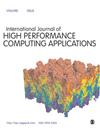A study on the performance of distributed training of data-driven CFD simulations
IF 2.5
3区 计算机科学
Q2 COMPUTER SCIENCE, HARDWARE & ARCHITECTURE
International Journal of High Performance Computing Applications
Pub Date : 2023-05-04
DOI:10.1177/10943420231160557
引用次数: 1
Abstract
Data-driven methods for computer simulations are blooming in many scientific areas. The traditional approach to simulating physical behaviors relies on solving partial differential equations (PDEs). Since calculating these iterative equations is highly both computationally demanding and time-consuming, data-driven methods leverage artificial intelligence (AI) techniques to alleviate that workload. Data-driven methods have to be trained in advance to provide their subsequent fast predictions; however, the cost of the training stage is non-negligible. This article presents a predictive model for inferencing future states of a specific fluid simulation that serves as a use case for evaluating different training alternatives. Particularly, this study compares the performance of only CPU, multi-GPU, and distributed approaches for training a time series forecasting deep learning model. With some slight code adaptations, results show and compare, in different implementations, the benefits of distributed GPU-enabled training for predicting high-accuracy states in a fraction of the time needed by the computational fluid dynamics solver.数据驱动CFD模拟的分布式训练性能研究
计算机模拟的数据驱动方法在许多科学领域蓬勃发展。模拟物理行为的传统方法依赖于求解偏微分方程。由于计算这些迭代方程的计算要求很高,也很耗时,数据驱动的方法利用人工智能(AI)技术来减轻工作量。数据驱动的方法必须事先进行训练,以提供其后续的快速预测;然而,训练阶段的成本是不可忽略的。本文提出了一个预测模型,用于推断特定流体模拟的未来状态,作为评估不同训练方案的用例。特别是,本研究比较了仅CPU、多GPU和分布式方法在训练时间序列预测深度学习模型方面的性能。经过一些轻微的代码调整,结果显示并比较了在不同实现中,分布式GPU训练的好处,可以在计算流体动力学求解器所需的一小部分时间内预测高精度状态。
本文章由计算机程序翻译,如有差异,请以英文原文为准。
求助全文
约1分钟内获得全文
求助全文
来源期刊
CiteScore
6.10
自引率
6.50%
发文量
32
审稿时长
>12 weeks
期刊介绍:
With ever increasing pressure for health services in all countries to meet rising demands, improve their quality and efficiency, and to be more accountable; the need for rigorous research and policy analysis has never been greater. The Journal of Health Services Research & Policy presents the latest scientific research, insightful overviews and reflections on underlying issues, and innovative, thought provoking contributions from leading academics and policy-makers. It provides ideas and hope for solving dilemmas that confront all countries.

 求助内容:
求助内容: 应助结果提醒方式:
应助结果提醒方式:


